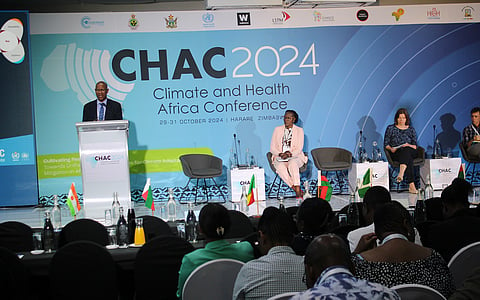

Representatives of African countries and global research experts are meeting in Zimbabwe’s capital, Harare, for the inaugural Climate and Health Africa Conference (CHAC 2024), a meeting that brings Africa into the global dialogue on the intersection of climate change and health.
The three-day conference, that is running from October 29-31, aims to address the urgent need to tackle the detrimental health impacts of climate change on health and wellbeing in Africa, where the burden of climate-sensitive diseases is disproportionately high, and adaptive capacities are limited.
More than 400 government officials, health and climate experts, researchers, academics and other stakeholders from most of the continent’s 54 countries and beyond are in attendance.
CHAC 2024 serves as a platform for sharing innovations, best practices, and solutions that enhance climate resilience in health.
More specifically, CHAC 2024 seeks to incorporate cutting-edge research evidence into understanding climate-health mechanisms, the health impacts, effective adaptation and mitigation intervention strategies, equitable climate research, and discuss how to effectively translate research into policy.
It also seeks guide Africa in redefining its approach to health within the context of climate change, fostering a stronger presence on the global stage. The conference’s outcomes are expected to include scientific publications, a comprehensive African Health and Climate Declaration, action plan blueprints for implementation, and the announcement of new partnerships and funding commitments.
Many African countries are suffering from varied combinations of the effects of climate change that range from droughts to cyclones to super-storms to floods to locust invasions and everything in between — all resulting from the relentless release of carbon emissions into the atmosphere. The United Nations Inter-governmental Panel on Climate Change (IPCC) says Africa contributes only three per cent of these emissions compared to China’s 23 per cent, the United States’ 19 per cent and the European Union’s contribution of 13 per cent, yet the continent is one of the worst affected by the devastations of climate change. As a result of climate change, more than 800 million people on the African continent are classed as food insecure. The African Development Bank (AfDB) estimates that the annual loss and damage costs due to climate change in its region are between $289.2 billion to $440.5 billion.
CHAC 2024 has been convened for the purpose of taking stock of the effect that this climate crisis is having on the health of people in Africa, a continent with least resources at its disposal.
Various research findings have established that climate change is directly and indirectly linked to human health, including through access to treatment and care.
Drought is regarded as a major consequence of anthropogenic climate change, with severe impacts on human health. These droughts have affected most people living in the Horn of Africa, the Sahel region, and southern regions of Africa with increasing frequency and duration and impact on health, exacerbated by these regions’ low adaptive capacity.
One study has established that the HIV crisis in Eswatini (formerly Swaziland) persists alongside the climate emergency, increasing poor health outcomes in individuals living with HIV. It was established that although there is no clinical evidence of a direct influence of climate change on the biological effect of HIV, changing weather patterns have an effect on the livelihoods and sustenance of children, adults, and caregivers, which may consequently increase the likelihood of HIV transmission and disrupt HIV care.
Running concurrently with CHAC 2024 is a meeting for the Climate and Health Africa Network for Collaboration and Engagement (CHANCE). CHANCE brings together researchers, policymakers, and other stakeholders involved in the intersection of climate change and health in Africa. Its objective is to promote networking, research, learning, policy development, and financing related to climate change and health in Africa. CHANCE facilitates stakeholder interactions, knowledge exchange, information sharing, collaboration on climate and health research, dissemination of best practices through case studies (including mitigation and adaptation measures), advocacy coordination, evidence-based policy development for Africa, and provision of technical assistance to enhance access to climate financing.
The conference is hosted by the Centre for Sexual Health and HIV/AIDS Research Zimbabwe (CeSHHAR) Zimbabwe in collaboration with the Zimbabwean Ministry of Environment, Climate and Wildlife and the Ministry of Health and Childcare.
The conference is being held under the theme Cultivating Resilience in Health… towards unified, equitable strategies for climate adaptation and mitigation in Africa. It drew participation from leading scientists from across the world who have been studying the impact of climate change on health both in Africa and in other parts of the world.